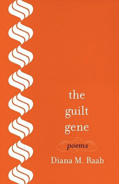 |
The Guilt Gene by Diana M. Raab Plain View Press
book review by Peter M. Fitzpatrick
"He smells each corner,
bush, newspaper, and empty can
but in the process, somehow
manages to squat on the grass
and dribble from a pocket
of nothingness, at least ten times."
This book of poetry is divided into six sections that range in topic from early childhood in "Cherry Blossoms" to mature woman as mother in "California Roll." "Two Evils" is discusses relationships, while "Yad Vashem" is world-oriented and engaged with the externals of time and space. "The Devil Wears a Poem" moves back into the author's self-oriented perspective. "Book Tour" explores the why and way of writing.
None of these eminently readable poems are simple descriptions or reactions to these concepts. Throughout this body of work, one is seamlessly and dramatically drawn to the self situated at the center amid variations on theme and changing scenarios. This self is a large one, essentially fearless, one that is rewarding to know.
Raab has an instinctual feel for artfully naming what modern philosophers have described as the "nothing" inside our existence. Pain, loss, suffering, the growing realization that we are bounded beings, inclined toward death—this is what is meant by "nothing." These are embedded and embodied poems. Titles like "Losing My Menopause," "Opposing Thumbs," and "Regurgitation" give some sense of this writer's innate feel for the soft-tissue slipperiness of being human. That she has done so without resorting to surrealist sophistication or overly technical virtuosity of wordplay is both refreshing and fruitful. It allows the poet to delineate the vitality and strength necessary to engage these "nothings." Raab's poems speak not of nihilism or despair. They encompass both the meaningful and the meaningless, perhaps, and they prove that a good poem (and a good poet) can go one more round with this milieu.
